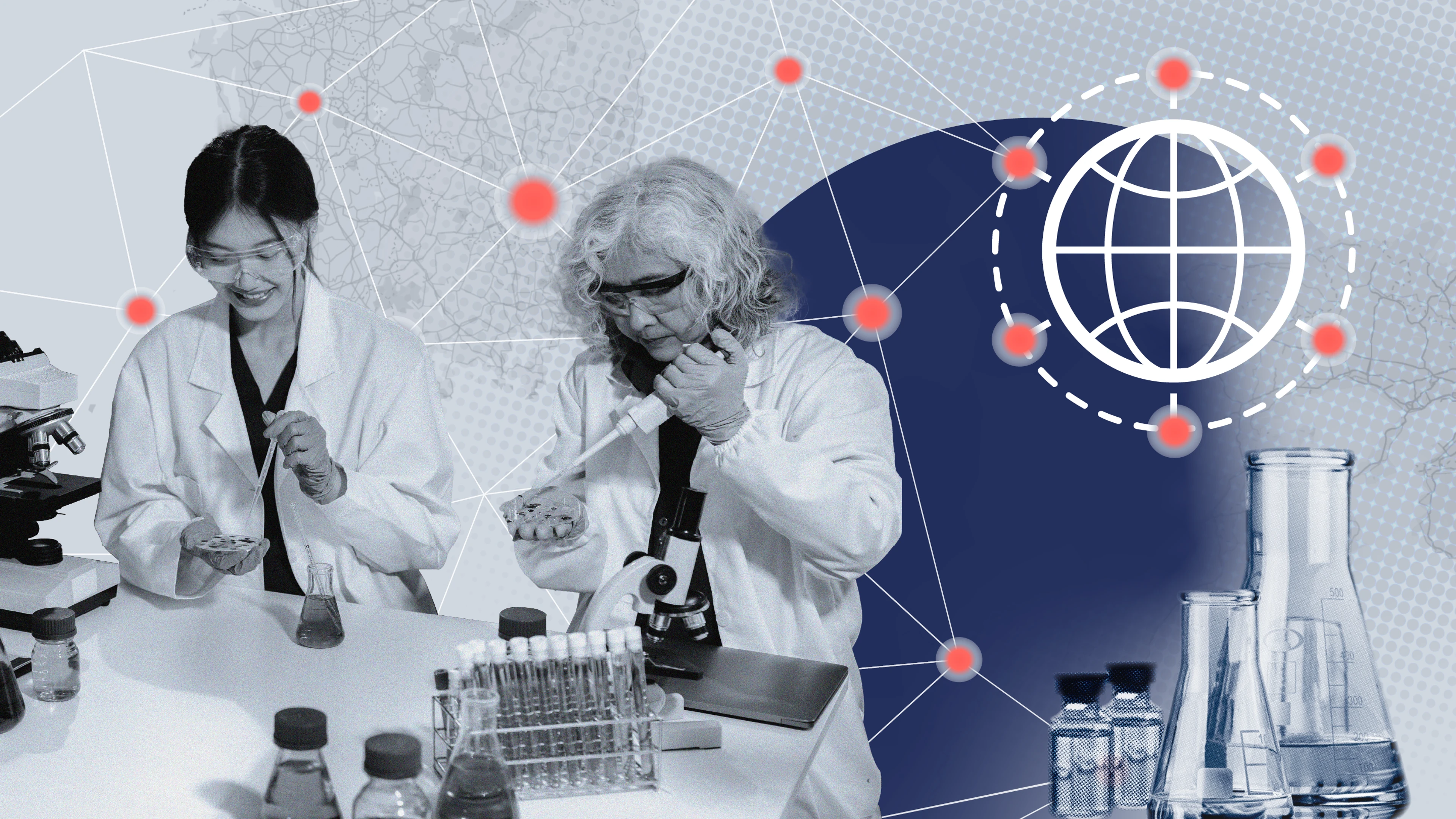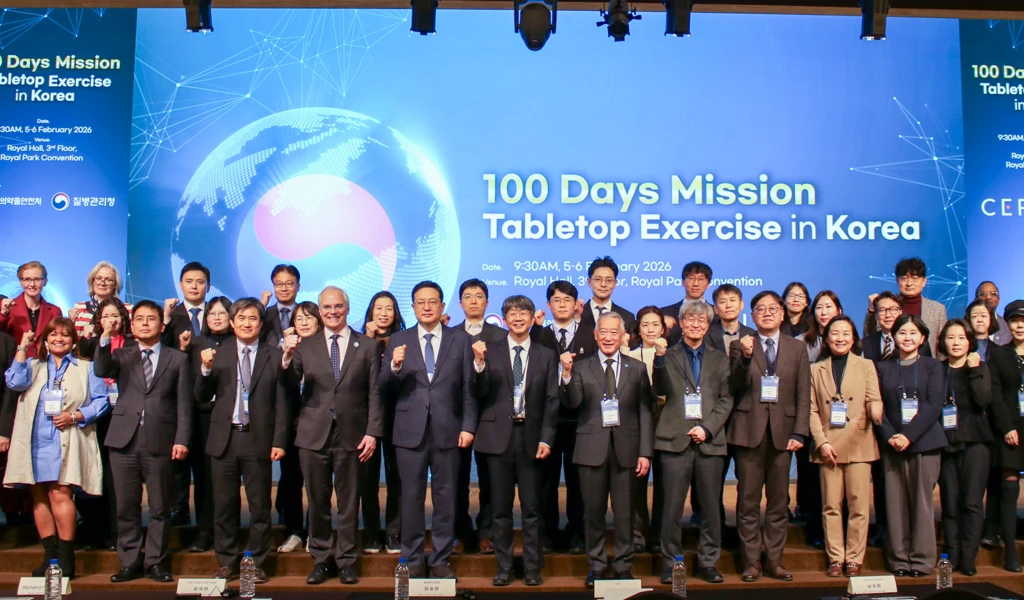- KDCA and IVI join global group of laboratories set up to standardise assessment of new vaccines.
- Expansion of network to Korea could help the country more quickly respond to future outbreaks.
- CEPI set up the centralised group of labs in 2020 to respond to the COVID-19 pandemic.
- KDCA and IVI already working with CEPI on pandemic preparedness and response efforts.
SEOUL/OSLO, 6 AUG—Two leading scientific organisations based in Korea, the Korea Disease Control and Prevention Agency (KDCA) and International Vaccine Institute (IVI), are joining the world’s largest network dedicated to the standardised testing of epidemic and pandemic vaccines.
Set up by the Coalition for Epidemic Preparedness Innovations (CEPI), the network aims to accelerate the development of vaccines to respond more quickly to future outbreaks of viral threats in as little as 100 days. This includes potentially deadly infections like coronaviruses, pandemic influenza, and a novel or as-yet-identified ‘Disease X’.
KDCA and IVI are the first institutions headquartered in Korea to join the network now made up of twenty laboratories. They will work together and with scientific groups across Africa, the Americas, Asia, Australasia and Europe as a ‘centralised laboratory’, using the same tools and protocols to evaluate multiple vaccine candidates created from different developers as though they have been tested ‘under one roof’. This can help overcome the current challenge of being unable to easily compare vaccine candidates as different measurements and techniques are used by different laboratories. Minimising variability in the vaccine data could help researchers and regulators based in Korea more rapidly select the best-performing vaccine candidates.
“When multiple vaccine candidates are undergoing testing, differences in how data is collected becomes an issue. As well as potential variations in markers of immunity, there can be distinctions in how and where samples are collected, transported and stored” explains Dr Kent Kester, Executive Director of Vaccine R&D at CEPI. “This impacts the quality and usefulness of the data produced. KDCA and IVI’s new membership to our Centralised Laboratory Network will lessen these problems, to more reliably and quickly evaluate potentially life-saving vaccines under development.”
Expanding CEPI’s Centralised Laboratory Network’s footprint to include sites in Korea could also help the region more quickly respond to an emerging local outbreak as time is not wasted shipping samples for testing to laboratories further afield.
“The inclusion of KDCA and IVI in CEPI’s Centralised Laboratory Network will facilitate harmonized and expedited evaluation of vaccine candidates during epidemics and pandemics,” says Dr. Manki Song, Deputy Director General of Science at IVI. “By joining this global network, KDCA and IVI can further increase their contributions to pandemic preparedness and global health security by enhancing our shared capabilities in clinical sample analysis and vaccine development.”
“By joining CEPI’s Centralised Laboratory Network together with IVI, KDCA expects to strengthen global partnerships in vaccine evaluation, enhancing preparedness for emerging infectious diseases and potential pandemic preparedness,” says Dr. Seungkwan Lim, Commissioner of KDCA. “To strengthen global health security, we will continue to expand our R&D infrastructure for vaccine development, targeting CEPI priority pathogens and Disease X, while deepening global research collaboration.”
As part of its broader policy priorities, the Korean government pledged during the June presidential election to expand joint research on infectious diseases, strengthen international cooperation in responding to public health crises, and enhance its infectious disease response systems.
Set up in 2020 in response to the COVID-19 pandemic, CEPI’s Centralised Laboratory Network has made significant contributions to the development of several COVID-19 vaccines and vaccines being designed against other emerging infectious diseases. CEPI has provided up to US $57 million to run the network.
To date, CEPI has allocated approximately US$350 million allocated to Korean companies and institutions advancing research to prepare for future epidemic and pandemic threats. This includes existing partnerships with KDCA and IVI. Since joining CEPI in 2020, the South Korean government has contributed $51 million to support CEPI’s global efforts.
ENDS
Notes to Editors
- The Centralised Laboratory Network focuses on the assessment of vaccines against CEPI’s priority list of pathogens including Lassa, Nipah, MERS, Ebola, Chikungunya, Rift Valley fever and COVID-19.
- Laboratory members also support testing of vaccines for other viral threats with epidemic or pandemic potential, like Mpox and Marburg, and are on standby to help fast-track the assessment of vaccine candidates against a Disease X—a novel or as-of-yet unidentified pathogen.
- CEPI’s Centralised Laboratory Network members are listed here. Laboratories are selected to join the network based on their capacity, experience and scientific expertise in testing clinical samples using high-quality systems.
- Data produced by members of the network is sent back to the vaccine developer. Neither CEPI nor the laboratory who assessed the samples owns the data.
About CEPI
CEPI was launched in 2017 as an innovative partnership between public, private, philanthropic and civil organisations. Its mission is to accelerate the development of vaccines and other biologic countermeasures against epidemic and pandemic disease threats and enable equitable access to them. CEPI has supported the development of more than 60 vaccine candidates or platform technologies against multiple known high-risk pathogens and is advancing the development of rapid response platforms for vaccines against a future Disease X. Central to CEPI’s pandemic-beating five-year plan for 2022-2026 is the ‘100 Days Mission’ to compress the time taken to develop safe, effective, globally accessible vaccines against new threats to just 100 days.
About The International Vaccine Institute (IVI)
The International Vaccine Institute (IVI) is an independent international organization originally established at the initiative of the United Nations Development Programme in 1997. Its mission is to discover, develop, and deliver safe, effective, and affordable vaccines—empowering vaccine equity, impact, and sustainability globally.
IVI’s current portfolio includes vaccines in multiple stages of pre-clinical and clinical development targeting infectious diseases that significantly impact low- and middle-income countries, including cholera, typhoid fever, chikungunya, shigellosis, salmonellosis, schistosomiasis, hepatitis E, HPV- and group A strep-related diseases, and COVID-19. IVI developed the world’s first low-cost oral cholera vaccine and a new-generation typhoid conjugate vaccine, both pre-qualified by the World Health Organization (WHO).
IVI is headquartered in Seoul, Republic of Korea with a Europe Regional Office in Sweden, an Africa Regional Office in Rwanda, a Country Office in Austria, and a Country and Project Office in Kenya. IVI additionally co-founded the Hong Kong Jockey Club Global Health Institute in Hong Kong and hosts Collaborating Centers in Ghana, Ethiopia, Madagascar, Burkina Faso, and Bhutan. More than 40countries and the WHO are members of IVI, and the governments of the Republic of Korea, Sweden, India, Finland, Austria, and Thailand provide state funding. For more information, please visit https://www.ivi.int.
About the Korea Disease Control and Prevention Agency (KDCA)
The Korea Disease Control and Prevention Agency (KDCA) is the national public health authority of the Republic of Korea. Guided by its vision of “Toward a safer and healthier future,” KDCA serves as the central governmental agency for evidence-based public health management and healthcare R&D.
KDCA’s mission is to protect people from infectious diseases, reduce the national disease burden, and strengthen research capacity and preparedness to address health risks. Through its affiliated Korea National Institute of Health (KNIH), KDCA supports vaccine development, immunological research, and global partnerships for epidemic and pandemic preparedness.
As a trusted public health partner, KDCA works closely with international organizations, including WHO, CEPI, and IVI, to promote equitable access to vaccines and strengthen global health security.
Slogan: Ensuring healthy lives with KDCA, your most trusted partner. For more information, please visit https://www.kdca.go.kr.



.webp)
